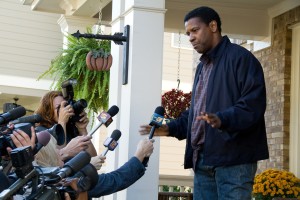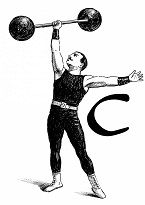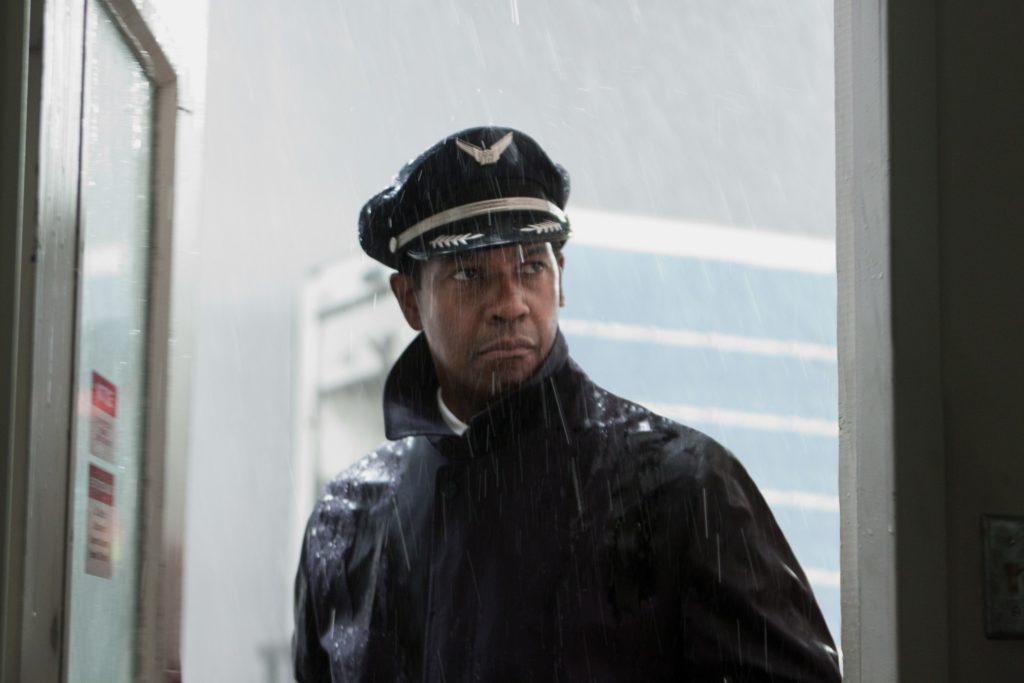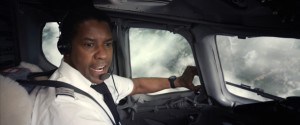Your chances of dying in a plane crash on a given flight are about one in eleven million. A miniscule risk, but perhaps not particularly comforting for most people. Apples-to-oranges comparisons between the rates of traffic fatalities and plane crashes aside, modern airline travel is an eminently safe form of transportation. Still, the sheer existential terror generated by a hundred-ton hunk of metal plummeting uncontrollably from the sky is impossible to overstate. If you catch the trailer for Denzel Washington’s latest flick, “Flight,” you’ll see a dramatic plane crash prominently featured, though the film is about much more than the dangers of flying. “Flight” never really soars after takeoff, but Denzel Washington’s performance is just strong enough to hold a creaky second half together.
Washington is troubled airline pilot “Whip” Whitaker. Whip fights off a hangover with some cocaine before showing up for work, then sneaks a few mini bottles of vodka from the drinks cart on the plane. The weather is poor on takeoff, but before long, Whip leaves the plane in the hands of his copilot and takes a nap. He is suddenly awakened by a major equipment malfunction and an uncontrolled dive from altitude. Pulling off a risky and highly-unorthodox maneuver to arrest the dive, Whip barely manages to save most of the passengers and crew when the plane crashes in a rural field.
Difficult questions arise, however, when Whip’s post-crash medical workup reveals his intoxication, and the families of the dead want to see him sent to prison for manslaughter.
The first half-hour of “Flight” is nothing short of engrossing. The build-up to the plane’s malfunction is tense, and the accident itself is utterly harrowing. Anxious moments in the cabin and cockpit are presented in agonizing detail; it seems all too real. Following the crash, we see Whip’s physical recovery, and observe as his guilt (as well as trepidation about the impending hearings over the accident) drive him to drink and take drugs to excess. We also meet Nicole, a recovering heroin addict who has a brief relationship with Whip, though Kelly Reilly’s performance in the role is decidedly flaccid. Even as a tumultuous, drug-fueled fling, it never comes off as true-to-life.
The film begins slipping from there. As the investigation deepens and Whip’s drinking worsens even further, we move from the jaunty classic rock soundtrack of the first half of the film to a ponderous, soft piano-accompanied slog. Whip’s troubles are belabored well past the point of necessity; languorous shots of liquor being poured into orange juice clutter nearly every scene. The plot devolves into heavily-clichéd territory, including a scene in which Whip blacks out while watching old home movies of his deceased father. His struggle is clear, and addiction is certainly serious subject matter, but the overwhelming melodrama cheapens the plot.
 Fortunately, Denzel Washington turns in a fine performance as Whip. He evinces the fragile pride and rampant self-deception of an addict, and keeps the film watchable even through its mawkish finish. The rest of the cast is mostly competent, with small but notable supporting roles by Don Cheadle as a forceful lawyer for the pilots’ union, and John Goodman as Whip’s oddball drug dealer. Director Robert Zemeckis (best known for his 2004 Academy Award for directing “Forrest Gump”) gets just enough out of most of the cast to keep the film from straying into unwatchable territory in its least effective stretches.
Fortunately, Denzel Washington turns in a fine performance as Whip. He evinces the fragile pride and rampant self-deception of an addict, and keeps the film watchable even through its mawkish finish. The rest of the cast is mostly competent, with small but notable supporting roles by Don Cheadle as a forceful lawyer for the pilots’ union, and John Goodman as Whip’s oddball drug dealer. Director Robert Zemeckis (best known for his 2004 Academy Award for directing “Forrest Gump”) gets just enough out of most of the cast to keep the film from straying into unwatchable territory in its least effective stretches.
On balance, “Flight” is a film with a compelling premise and a very good lead performance that just fails to deliver. The climactic hearing scene never manages to live up to the drama of the plane crash episode, leaving the impression that the film just peters out as its 139-minute runtime wears on. It never veers too far toward preachiness, but viewers who disapprove of faith-based drug treatment programs are likely to find it heavy-handed toward the finish. Unfortunately for “Flight,” there’s enough good acting out there that the film just isn’t worth recommending on its lone unique strength (the plane crash sequence). “Flight” is likely to please avid aviation aficionados and rehabilitated former addicts, but most others will find it to be one overlong trip not worth taking.
– by Demian Morrisroe




1 Comment
Pingback: » The Hurt Locker (R)